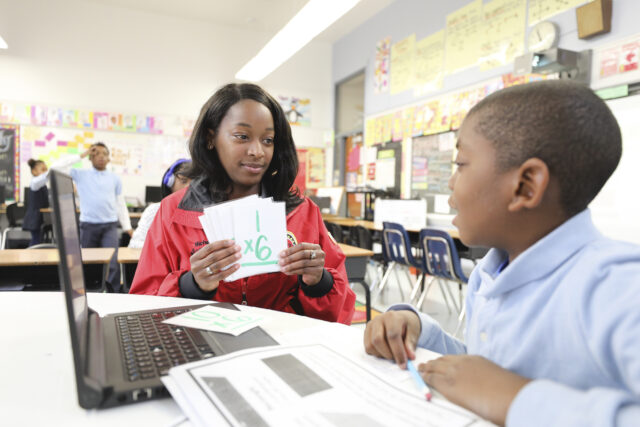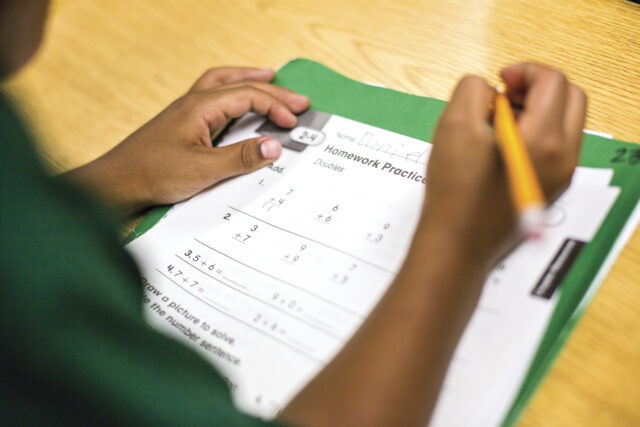From “not a math person” to a City Year math learner
People often characterize themselves as being a “math person” or “not a math person.” When we leave the classroom, our perceptions of math can influence how we navigate the world and continue to interact with the subject into adulthood—whether that’s budgeting for a mortgage or helping younger siblings with their algebra homework.
If our math experience was negative, math-related tasks can fill us with dread and make us avoid math in little ways, from second guessing how much to tip, to big ways, like how math anxiety can affect how we teach students.

Kristen Olmsted is the national director of math programs at City Year. She uses research and best teaching practices to design training, strategies and resources to prepare thousands of AmeriCorps members who help to support students across 29 U.S. cities as student success coaches—near-peer tutors, mentors and role models who build positive relationships with students and help them grow academically, socially and emotionally.
Kristen and I discussed what it means to be a “math learner” and how a growth mindset is important to promote an environment of learning and model for students how they can recover from setbacks and achieve goals in a world where math can sometimes feel intimidating and binary.
The difference between being a “math learner” and a “math person”
Hanna Kim (HK): What does it mean to be a math learner?
Kristen Olmsted (KO): Being a math learner means being open to curiosity and exploration. And being open to the idea of building on what you know to figure out what you don’t know. You’re giving yourself permission to make mistakes because you’re able to learn and grow from them.
HK: How can we help students become math learners?
KO: By meeting the students where they are at and leveraging our relationships with the students to share power and knowledge. This shifts the power dynamic of the adult holding all the knowledge to creating a more inclusive and collaborative learning space for all participants.
If we both approach math as learners, a teacher or AmeriCorps member can be more inquisitive about finding out from the student how they’re thinking. That way, it’s not feeling like “No, you’re wrong,” and instead it feels more like “Let’s do this together, we’re building a muscle together.” Everything doesn’t feel so bleak because it’s just right or wrong.

Boosting math confidence
HK: Prior to our conversation, I’ve always thought of myself as someone who’s not a “math person.” I have this vivid memory of crying over fractions in elementary school and I was worried about how to teach fractions to my own students when I served as a corps member with City Year Philadelphia.
My impact manager’s favorite subject happened to be math and she showed me how to use manipulatives like blocks and cubes to break the content down easier. This helped me feel more comfortable because at this point in my life I knew how to do fractions but I just wasn’t sure how I would explain content to my students when I had trouble learning when I was their age.
KO: And I think it’s totally okay sharing that experience with students because that builds that human connection of students realizing that their corps members were able to learn from their own struggles.
HK: Being vulnerable can be hard sometimes. What are some things AmeriCorps members can do to build that human connection with students to help them ease into doing math?
KO: One way to help students ease into math is making them “practice math outside of math” by creating and having opportunities that expose students to math in fun, different and more applicable ways. And then debrief that experience with the students and ask them, “So what did you do today?”
“I just played a game.”
“But what did you do during the game?”
Having those small wins first can be helpful because telling a student “you have to complete all of these problems on this worksheet” can be a daunting task. We could build confidence outside of the math class and then we can work on the worksheet.
HK: I used to play a lot of games with my students during our math lessons. I had one student who loved basketball so I would ball up paper and let him play “trashket” ball. Depending on his level of fluency or if it was just late in the day, I would let him either throw a basket after every five questions he answered correctly or after every right question.
City Year AmeriCorps members can be math learners too
HK: We talked about how we can support students in being math learners. But, as student success coaches, corps members should also become math learners. Do you have any tips on how they can start leaning into this?
KO: We’re all growing and changing no matter what, but when we are corps members, we want to show up for students. It’s that ability to see what reservations that we don’t want to necessarily instill in our students.
During math training corps members could do a mindfulness scan, “Okay, what is triggering me right now? What is making me feel this way? How can I work on that to help my students that might feel the same way?” Be open to seeing how math education has changed over the years so it might be different than the way they learned it so be open to seeing the different ways of learning math too.
Think of building an experience that is built on what the students need and what by how they want to show up in a space. I think that’s the beauty of our afterschool program and small group spaces is that they can be really tailored to individual students.
HK: Thinking of how much teaching and learning math has changed over the years, that reminds me of how my teammates would come to the office and we’d ask each other how to solve a problem. So, everyone would bring out their whiteboard and we would help solve the problem together.
KO: Even sharing an experience like that can be helpful. Students could learn how to work in small groups and build this idea of collaboration. In class students still need to do their own work but being in a small group is an opportunity to practice and try other ways of doing math that might finally make sense to the student.
Sometimes your way of explaining a topic didn’t work, but their peers’ way of explaining it does. It’s comforting having everyone share and not have to feel like they’re the expert in it.
HK: We’ve talked about how being a math learner can have lasting effects, but are there non-student related examples on how this can show up during service for corps members?
KO: When corps members share their life-after-City Year-plan with me, a lot of them have told me how math training has benefited them. Reviewing math they haven’t touched in a long time has helped them prepare for undergrad or taking the GRE or GMAT for grad school.
So, math during City Year can be an opportunity for corps members too.
Learn more about serving with City Year or start your application today!
Hanna Kim is City Year’s national communications manager and is an alum of City Year Philadelphia, where she served as an AmeriCorps member at William D. Kelley School in 2019-2020.
Related stories
We hear time and time again from corps members and alums that when they first joined City Year as an...
Read more about A snapshot of City Year service as a student success coachAs a new City Year AmeriCorps member, you’re about to embark on a transformative journey—and it all begins with Basic...
Read more about Welcome to City Year’s Basic Training Academy: Your First Step Toward ImpactHow do you make your application stand out? Check out these tips from our recruitment staff
Read more about Tips and tricks for a great applicationCity Year Providence AmeriCorps alumnus Justin Roias knows firsthand how positive relationships with caring adults can help children succeed as...
Read more about Mentoring students: a two-way street














